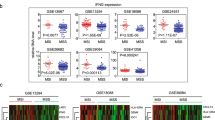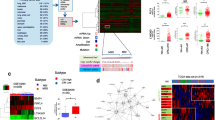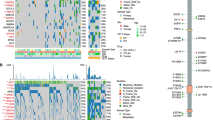Abstract
Background
Recent advances in immune checkpoint blockade (ICB) have improved patient prognosis in mismatch repair-deficient and microsatellite instability-high colorectal cancer (dMMR/MSI-H CRC); however, PD-1 blockade has faced a challenge in early progressive disease. We aimed to understand the early event in ICB resistance using an in vivo model.
Methods
We subcutaneously transplanted the MC38 colon cancer cells into C57BL/6 mice, intraperitoneally injected anti-PD-1 antibody and then isolated ICB-resistant subclones from the recurrent tumors.
Results
Comparative gene expression analysis discovered seven genes significantly downregulated in the ICB-resistant cells. Tumorigenicity assay of the MC38 cells knocked out each of the seven candidate genes into C57BL/6 mice treated with anti-PD-1 antibody and bioinformatics analysis of the relationship between the expression of the seven candidate genes and the outcome of cancer patients receiving immunotherapy identified Rtp4, an interferon-stimulated gene and a chaperon protein of G protein-coupled receptors, as a gene involved in ICB resistance. Immunohistochemical analysis of transplanted tumor tissues demonstrated that anti-PD-1 antibody failed to recruit T lymphocytes in the Rtp4-KO MC38 cells. Mouse and human RTP4 expression could be silenced via histone H3 lysine 9 (H3K9) trimethylation, and public transcriptome data indicated the high expression level of RTP4 in most but not all of dMMR/MSI-H CRC.
Conclusions
We clarified that RTP4 could be silenced by histone H3K9 methylation as the early event of ICB resistance. RTP4 expression could be a promising biomarker for predicting ICB response, and the combination of epigenetic drugs and immune checkpoint inhibitors might exhibit synergistic effects on dMMR/MSI-H CRC.







Similar content being viewed by others
Abbreviations
- BSS:
-
Bisulfite sequencing
- CCLE:
-
Cancer cell line encyclopedia
- ChIP:
-
Chromatin immunoprecipitation
- CMS:
-
Consensus molecular subtype
- CRC:
-
Colorectal cancer
- dMMR:
-
Mismatch repair-deficient
- FBS:
-
Fetal bovine serum
- GDC:
-
National Cancer Institute Genomic Data Commons
- H3K9:
-
Histone H3 lysine 9
- HDAC:
-
Histone deacetylase
- ICB:
-
Immune checkpoint blockade
- IFN:
-
Interferon
- JAK:
-
Janus kinase
- KO:
-
Knockout
- MHC-I:
-
Major histocompatibility complex class 1
- MSI-H:
-
Microsatellite instability-high
- MSS:
-
Microsatellite stable
- OS:
-
Overall survival
- PFS:
-
Progression-free survival
- pMMR:
-
Mismatch repair-proficient
- TCGA:
-
Cancer Genome Atlas Research Network
- TIDE:
-
Tumor Immune Dysfunction and Exclusion
References
Topalian SL, Hodi FS, Brahmer JR, et al. Safety, activity, and immune correlates of anti-PD-1 antibody in cancer. N Engl J Med. 2012;366:2443–54.
Topalian SL, Taube JM, Anders RA, et al. Mechanism-driven biomarkers to guide immune checkpoint blockade in cancer therapy. Nat Rev Cancer. 2016;16:275–87.
Nicolantonio FD, Vitiello PP, Marsoni S, et al. Precision oncology in metastatic colorectal cancer—from biology to medicine. Nat Rev Clin Oncol. 2021;18:506–25.
Ribic CM, Sargent DJ, Moore MJ, et al. Tumor microsatellite-instability status as a predictor of benefit from fluorouracil-based adjuvant chemotherapy for colon cancer. N Engl J Med. 2003;349:247–57.
Venderbosch S, Nagtegaal ID, Maughan TS, et al. Mismatch repair status and BRAF mutation status in metastatic colorectal cancer patients: a pooled analysis of the CAIRO, CAIRO2, COIN, and FOCUS studies. Clin Cancer Res. 2014;20:5322–30.
Guinney J, Dienstmann R, Wang X, et al. The consensus molecular subtypes of colorectal cancer. Nat Med. 2015;21:1350–6.
Le DT, Uram JN, Wang H, et al. PD-1 blockade in tumors with mismatch-repair deficiency. N Engl J Med. 2015;372:2509–20.
Overman MJ, McDermott R, Leach JL, et al. Nivolumab in patients with metastatic DNA mismatch repair-deficient or microsatellite instability-high colorectal cancer (CheckMate 142): an open-label, multicentre, phase 2 study. Lancet Oncol. 2017;18:1182–91.
Le DT, Kim TW, Cutsem EV, et al. Phase II open-label study of pembrolizumab in treatment-refractory, microsatellite instability-high/mismatch repair-deficient metastatic colorectal cancer: keynote-164. J Clin Oncol. 2020;38:11–9.
André T, Shiu K, Kim TW, et al. Pembrolizumab in microsatellite-instability-high advanced colorectal cancer. N Engl J Med. 2020;383:2207–18.
Jenkins RW, Barbie DA, Flaherty KT. Mechanisms of resistance to immune checkpoint inhibitors. Br J Cancer. 2018;118:9–16.
Kalbasi A, Ribas A. Tumour-intrinsic resistance to immune checkpoint blockade. Nat Rev Immunol. 2020;20:25–39.
Shalem O, Sanjana NE, Hartenian E, et al. Genome-scale CRISPR-Cas9 knockout screening in human cells. Science. 2014;343:84–7.
Sakuma T, Nakade S, Sakane Y, et al. MMEJ-assisted gene knock-in using TALENs and CRISPR-Cas9 with the PITCh systems. Nat Protoc. 2016;11:118–33.
Dennis G Jr, Sherman BT, Hosack DA, et al. DAVID: database for annotation, visualization, and integrated discovery. Genome Biol. 2003;4:P3.
Fu J, Li K, Zhang W, et al. Large-scale public data reuse to model immunotherapy response and resistance. Genome Med. 2020;12:21.
Sveen A, Bruun J, Eide PW, et al. Colorectal cancer consensus molecular subtypes translated to preclinical models uncover potentially targetable cancer cell dependencies. Clin Cancer Res. 2018;24:794–806.
Gide TN, Quek C, Menzies AM, et al. distinct immune cell populations define response to anti-PD-1 monotherapy and anti-PD-1/anti-CTLA-4 combined therapy. Cancer Cell. 2019;35:238–55.
Zaretsky JM, Garcia-Diaz A, Shin DS, et al. Mutations associated with acquired resistance to PD-1 blockade in melanoma. N Engl J Med. 2016;375:819–29.
Manguso RT, Pope HW, Zimmer MD, et al. In vivo CRISPR screening identifies Ptpn2 as a cancer immunotherapy target. Nature. 2017;547:413–8.
Schoggins JW, Wilson SJ, Panis M, et al. A diverse range of gene products are effectors of the type I interferon antiviral response. Nature. 2011;472:481–5.
He X, Ashbrook AW, Du Y, et al. RTP4 inhibits IFN-I response and enhances experimental cerebral malaria and neuropathology. Proc Natl Acad Sci U S A. 2020;117:19465–74.
Boys IN, Xu E, Mar KB, et al. RTP4 is a potent IFN-inducible anti-flavivirus effector engaged in a host-virus arms race in bats and other mammals. Cell Host Microbe. 2020;28:712–23.
Wroblewska A, Dhainaut M, Ben-Zvi B, et al. Protein barcodes enable high-dimensional single-cell CRISPR screens. Cell. 2018;175:1141–55.
Pascual-García M, Bonfill-Teixidor E, Planas-Rigol E, et al. LIF regulates CXCL9 in tumor-associated macrophages and prevents CD8+ T cell tumor-infiltration impairing anti-PD1 therapy. Nat Commun. 2019;10:2416.
Wiede F, Lu KH, Du X, et al. PTP1B is an intracellular checkpoint that limits T-cell and CAR T-cell antitumor immunity. Cancer Discov. 2022;12:752–73.
Zhao J, Chen AX, Gartrell RD, et al. Immune and genomic correlates of response to anti-PD-1 immunotherapy in glioblastoma. Nat Med. 2019;25:462–9.
Mariathasan S, Turley SJ, Nickles D, et al. TGFβ attenuates tumour response to PD-L1 blockade by contributing to exclusion of T cells. Nature. 2018;554:544–8.
Hogg SJ, Beavis PA, Dawson MA, et al. Targeting the epigenetic regulation of antitumour immunity. Nat Rev Drug Discov. 2020;19:776–800.
Griffin GK, Wu J, Iracheta-Vellve A, et al. Epigenetic silencing by SETDB1 suppresses tumour intrinsic immunogenicity. Nature. 2021;595:309–14.
Burr ML, Sparbier CE, Chan KL, et al. An evolutionarily conserved function of polycomb silences the MHC class I antigen presentation pathway and enables immune evasion in cancer. Cancer Cell. 2019;36:385–401.
Segovia C, José-Enériz ES, Munera-Maravilla E, et al. Inhibition of a G9a/DNMT network triggers immune-mediated bladder cancer regression. Nat Med. 2019;25:1073–81.
Woods DM, Sodré AL, Villagra A, et al. HDAC inhibition upregulates PD-1 ligands in melanoma and augments immunotherapy with PD-1 blockade. Cancer Immunol Res. 2015;3:1375–85.
Efremova M, Rieder D, Klepsch V, et al. Targeting immune checkpoints potentiates immunoediting and changes the dynamics of tumor evolution. Nat Commun. 2018;9:32.
Kang YK, Boku N, Satoh T, et al. Nivolumab in patients with advanced gastric or gastro-oesophageal junction cancer refractory to, or intolerant of, at least two previous chemotherapy regimens (ONO-4538-12, ATTRACTION-2): a randomised, double-blind, placebo-controlled, phase 3 trial. Lancet. 2017;390:2461–71.
Makker V, Colombo N, Herráez AC, et al. Lenvatinib plus pembrolizumab for advanced endometrial cancer. N Engl J Med. 2022;386:437–48.
Acknowledgements
We thank Ms. Hiromi Nagasaki for technical assistance. The plasmid lentiCRISPR v2 (#52961; Addgene) was a gift from Dr. Feng Zhang. The plasmids psPAX2 (#12260; Addgene) and pMD2.G (#12259; Addgene) were generously provided from Dr. Didier Trono. This work was supported by Grants-in-Aid for Scientific Research (A; 19H01055) and Challenging Research (Exploratory; 22K19554) from the Ministry of Education, Culture, Sports, Science and Technology of Japan; Research Grant from the Princess Takamatsu Cancer Research Fund; P-CREATE (JP19cm0106540) from AMED (Japan Agency for Medical Research and Development).
Author information
Authors and Affiliations
Contributions
YY, SS, YA, ST (Tsukihara) and RS performed experiments and analyzed data. YY and SS wrote the manuscript. YA, AK, MT, YK (Kinugasa), YK (Kawakami) and ST (Tanaka) revised the manuscript. SS and ST (Tanaka) designed the study. SS performed bioinformatics analysis and visualized data. YK (Kawakami) provided suggestions for immunological assays. ST (Tanaka) supervised the study.
Corresponding authors
Ethics declarations
Conflict of interest
The authors declare that they have no conflict of interest.
Additional information
Publisher's Note
Springer Nature remains neutral with regard to jurisdictional claims in published maps and institutional affiliations.
Supplementary Information
Below is the link to the electronic supplementary material.
Rights and permissions
Springer Nature or its licensor (e.g. a society or other partner) holds exclusive rights to this article under a publishing agreement with the author(s) or other rightsholder(s); author self-archiving of the accepted manuscript version of this article is solely governed by the terms of such publishing agreement and applicable law.
About this article
Cite this article
Yamamoto, Y., Shimada, S., Akiyama, Y. et al. RTP4 silencing provokes tumor-intrinsic resistance to immune checkpoint blockade in colorectal cancer. J Gastroenterol 58, 540–553 (2023). https://doi.org/10.1007/s00535-023-01969-w
Received:
Accepted:
Published:
Issue Date:
DOI: https://doi.org/10.1007/s00535-023-01969-w




